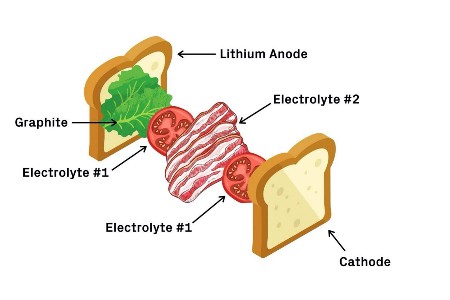In the journal Nature this month, a team at Harvard University’s School of Engineering and Applied Sciences published the results of their research into solid-state battery design. Team lead, Associate Professor Xin Li described their effort as a search for the Holy Grail of batteries which Li believes has been found.
Lithium-ion batteries today dominate the electric vehicle (EV) industry. But the energy density and durability of the technology have led to range and ownership anxiety on the part of potential purchasers of EVs. A battery with greater density, lighter in weight, and more durable in terms of discharge-recharge cycles would be the breakthrough the planet needs to ween ourselves off the internal combustion engine and the greenhouse gas contributions this technology contributes to global warming.
The 631.1-watt-hours per kilogram (Wh/kg) measure achieved by this battery, and its ability to retain 82% capacity after 10,000 discharge-recharge cycles leaves lithium-ion battery packs in the dust. It means EVs equipped with these batteries will easily match the durability of gasoline and diesel-powered vehicles which on average is between 10 and 15 years.
In an interview by Anthony Cuthbertson of The Independent, Li is quoted stating, “This….design shows that lithium-metal solid-state batteries could be competitive with commercial lithium-ion batteries. And the flexibility and versatility of our multilayer design makes it potentially compatible with mass production procedures in the battery industry.”
Current lithium-ion battery packs produce around 250 Wh/kg. Hydrogen fuel cells in comparison produce 530 Wh/kg. Lithium-ion battery packs on average can be discharged and recharged about 900 times before the upper capacity begins to degrade. Even so, current lithium-ion batteries come with 8-year warranties or 160,000 kilometres (100,000 miles) drive limits which probably means if you currently own an EV, at some point that warranty is going to come into play requiring a new battery pack.
So the performance demonstrated by this Harvard team’s lithium-metal battery at 631.1 Wh/kg and 10,000 discharge and recharge cycles is indeed impressive. And one other thing, this new battery fully recharges in between 10 and 20 minutes. That too is an impressive performance improvement.
The secret to the design of the Harvard battery is an innovative multilayer self-healing assembly which deals with degradation common to lithium-ion battery technology. That degradation you may have experienced when your smartphone starts to overheat. That won’t happen with the lithium-metal solid-state technology design which can be compared to a bacon-lettuce-and-tomato (BLT) sandwich as seen in the illustration above.
Can the battery be scaled down for use where lithium-ion is found today? Think cell phones and A, AA, AAA rechargeables? For the moment, the Harvard invention is at the EV battery-pack scale. But the chemistry and design of lithium-metal should allow the technology to go small sometime in the near future.
















